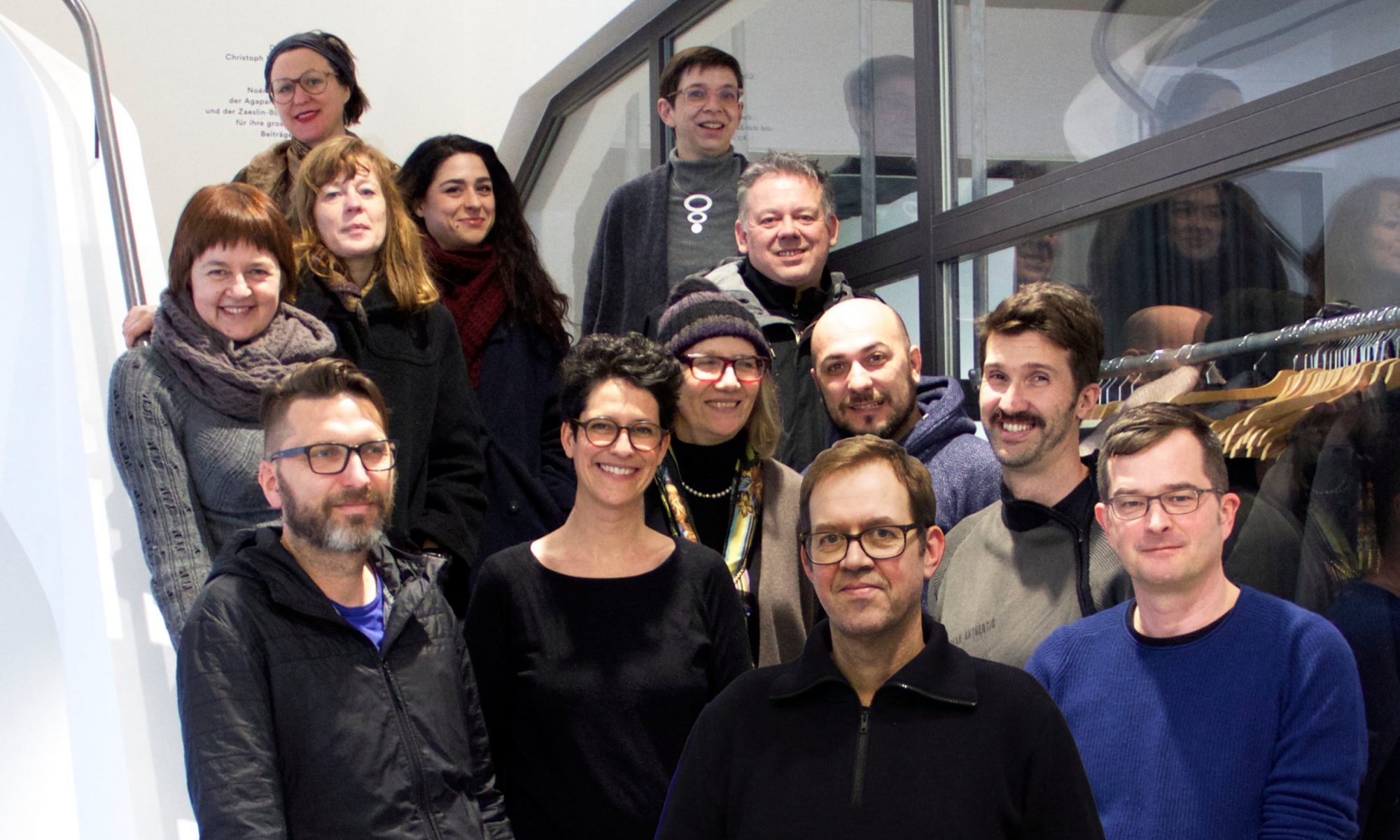1-4 April 2018
Participants: (from left to right):
top row: Stefanie Wuschitz (Mz Baltazars Laboratory Vienna), Laurence Rassel (erg Brussels, constant Brussels)
2nd row: Ruth Catlow (furtherfield London), Rahel Puffert (University Oldenburg), Patricia Reis (Mz Baltazars Laboratory Vienna), Marc Garrett (furtherfield London)
3rd row (middle to left): Cornelia Sollfrank (CC research project), Mario Purkathofer (Dock18 Zürich), Zeljko Blace (MaMa/ccSPORT)
bottom row: Marek Tuszinsky (tactical tech Berlin), Shusha Niederberger (CC research project), Peter Westenberg (constant Brussels), Felix Stalder (CC research project).
Not in picture: Penny Travlou, University of Edinburgh
Venue: Hek (House of electronic Arts, Basel)
Report
The two-day research meeting was preceded by an evening lecture by Laurence Rassel, the director of e.r.g. (École de Recherche Graphique, Brussels). In her lecture, she elaborated on her way of managing the art school for which she has conceived a method that combines elements from open source software, feminism, and institutional psychotherapy. Rassel also took part in the next two days’ meetings in which her model served as a reference for reforming the institution from within, while all the other invited projects are self-organized institutions.
In a first-round all the participants introduced their organizations which clearly demonstrated a huge variety not just in scale, but also in terms of objectives and forms of organization reaching from non-profit businesses with 30+ employees to associations without any employees that are largely based on volunteer work.
The introductions were followed by two theoretical inputs, one by Penny Travlou (remotely), and one by Rahel Puffert. As an ethnographer Travlou, for many years, has conducted research on collaborative practices, collaborative economies and networks, everyday commoning practices related to questions of self-organization, alternative and circular economies, de-growth, and sharing practices (rhizomic ethnographies), investigating local projects (e.g. in Athens and Medellin), but also considering the transglobal scale via distant platforms. She works with the term commons, engaging in a critical discourse on commons, updating it to accommodate concepts such as the “other” and the “stranger” (as a member of the community e.g. in refugee projects), to decolonize knowledge practices (e.g. peer-to-peer-learning with indigenous), to establish concepts of collaboration based on time, i.e. to build trust over time by slowing down as activist and academic practice, to create shared cultural values via commoning. Stewardship and care are core elements of cultural commoning in her understanding, also considering feminist discourses on reproduction, which underline some of the ideas articulated in the first workshop. Her notion of the commons also combines informational/digital commons and urban/educational commons and reflects social practices that unleash peoples’ capacity to create things together and take their lives and livelihood in their own hands. Her research is aligned along the concepts of culture and creativity in particular. The second input by Rahel Puffert introduced various concepts and aspects of the “institution” that could serve as a basis for the following discussion. With her personal background in pedagogy, Puffert chooses the “school” to be one example of “institution,” transferring the earlier introduced categories –affirmative/descriptive, critical/deconstructive, and mediating between the two – to this basic institutional format. Following theoreticians such as Parsons, Illich, Foucault, or Bourdieu, she elaborated on how schools are conceptualized as either supporting society as it is (integration, adjustment, achieving of goals, preservation of norms ) OR enabling learning and critical thought. In this context, she suggested distinguishing between “school” and “learning” and pointed out the advantages of both, institutionalized and self-organized learning environments.
Triggered by the theory inputs, the rest of the meeting consisted of moderated work sessions between all participants along prepared questions. The questions included e.g. how experiences in self-organized contexts are different from experiences with and within institutions, what the particular institution produces and holds in common (e.g. space, publications, knowledge, services (hosting), skills (campaigning), tools, libraries, methods, code, films, manuals, reading lists, situations, redistribution of money, etc.), what the organizing principles and agreements are for the various projects are (e.g. association, foundation, company, etc.), if and how they define roles and functions within their structures (questions of leadership, power, and decision-making), if and how self-critical modes of working and rules for rotation e.g. are in place, if ways of working are being reflected and made transparent (internally and externally) e.g. through documentation as in open source, what the funding models are (public, private, self-funded, etc.) and aspects of sustainability and transition. Another considerable part of the discussion was circling around the question of how aesthetics could be understood and defined in the context of organisational practice. It was suggested that the act of (consciously) giving form to a material, an action, a relationship to the world, technology, an institution and thus making something perceivable, visible, transferable, and “beautiful” can be understood as aesthetic practice.
Almost all the projects embody different approaches and values, but what all of them hold in common, was an understanding that they are more or less embedded in the current capitalist/neoliberal system while using their organization/space to create, live and promote their own social imaginations for which DIWO (doing it with others), collectivity and collaboration are important features as well as the provision and care for shared resources. This outcome suggests a proximity to the commons discourse that the projects share.
Interviews conducted with participants
Institutional Practice with Peter Westenberg
Networking Institutions with Z. Blace
Negotiating Space in Culture and Technology with Ruth Catlow and Marc Garrett.
Working with the Paradoxes of Technology with Marek Tuszynski
Feminist Hackspace with Patricia Reis and Stephanie Wuschitz
Experimenting with Institutional Formats with Laurence Rassel


